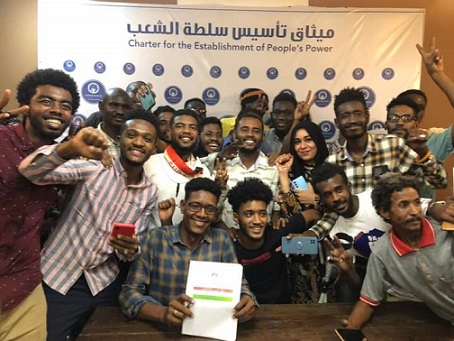Khartoum Resistance Committees sign political charter to topple Sudan’s military regime
May 11, 2022 (KHARTOUM) – 15 Resistance Committees in Khartoum State, endorsed on Wednesday a political charter establishing a unified political platform for the neighbourhood-based groups that lead the anti-coup protests.
The People’s Authority Charter was signed after lengthy discussions by the youth groups that lasted for over two months.
The document seen by the Sudan Tribune reaffirmed the signatory’s rejection of direct or indirect negotiations with the coup leaders and their determination to topple the putschists through peaceful resistance.
“Repeal the Constitutional Document and adoption of a temporary constitutional declaration based on the People’s Authority Charter. Also, “Review all concluded agreements and decrees issued since April 11th, 2019.
The Committees have refused to join the dialogue process facilitated by the African Union, IGAD and UNITAMS.
The youth groups of Khartoum state are the most active committees in the country.
The Sudanese security services continue to hold 88 activists in prison despite their pledge to release all the political detainees who are all from Khartoum state.
At least 95 people have been killed in six-month protests against the coup in Sudan. Only three of them were from outside Khartoum.
The charter provides that the transitional period would last for two years and this term and be extended by the Transitional Legislative Council.
The transitional legislative chamber is designed to be the centre of power as the legislators would nominate and appoint the prime minister and his cabinet.
Also, the prime minister and the cabinet members are accountable before the legislative council.
“The Transitional National Legislative Council is the supreme authority of the state,” reads the charter.
The committees during the popular uprising from December 2018 to April 2019 before the collapse of the al-Bashir regime, seconded the activities of the political groups and the Sudanese Professional Association, the spearhead of the December Revolution.
After the coup, they took the lead in the protest movement and have been forced to coordinate the organisation of the protests and exchange information.
The youth committees had to fill the vacuum created by the weakness of political parties and the failure of their government to properly drive the transition.
They were critical of the Hamdok government, particularly on the delayed justice. But they supported the FFC forces in their strained relations with the military component, which is accused of killing hundreds of protesters.
The signed charter stresses the need to form several commissions for transitional justice, peace and reform of the security and military entities.
With regard to the reform of the security sector, the document speaks about “Rebuilding the National Intelligence Service and limiting its powers to the collection and analysis of information”. Also, “disbanding” the armed militias including the Rapid Support Forces and integration of the former rebel groups into the national army.
The civil service and the judicial authority also must be reformed, according to the document as they are badly perceived by the anti-coup movement.
Abel Fattah al-Burhan, the head of the military-led Sovereign Council, reinstated the sacked Sudanese Islamists in the civil service and he is currently governing the country with the same policies and staff of the former regime.
(ST)

